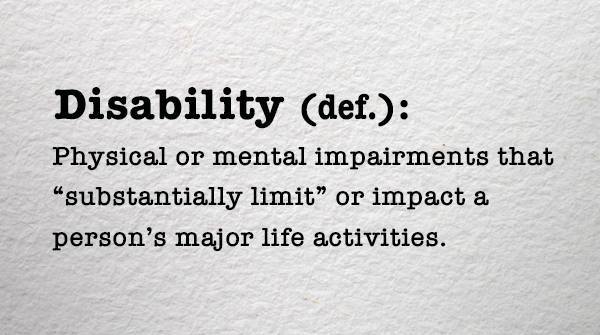 July is Disability Pride Month, which recognizes the enactment of the Americans with Disabilities Act that was designed to require equal rights and access for individuals with disabilities. As employers, we always want to operate within the confines of the law – and this month presents a great opportunity to review the ADA’s broad strokes as we strive to ensure that our businesses are ADA compliant.
July is Disability Pride Month, which recognizes the enactment of the Americans with Disabilities Act that was designed to require equal rights and access for individuals with disabilities. As employers, we always want to operate within the confines of the law – and this month presents a great opportunity to review the ADA’s broad strokes as we strive to ensure that our businesses are ADA compliant.
The ADA, which became law in 1990 and was updated in 2008, includes a series of regulations with five titles that ensure equal rights and opportunities for people with disabilities.
- Title I: Employment
- Title II: State and Local Government
- Title III: Public Accommodations
- Title IV: Telecommunications
- Title V: Miscellaneous Provisions
Businesses can accommodate individuals with disabilities in a variety of ways to comply with the ADA. Here are some examples:
Architectural and physical barriers
The ADA requires businesses to make their entrance and interior accessible to all. This includes offering handicapped parking, removing barriers, repositioning furniture to clear a path, or providing ramps or elevators as an alternative to stairs.
Communication
Employers should assist those with vision, hearing, and/or speech disabilities by providing auxiliary aids and services, especially for phone calls or websites.
Policies
A thorough, periodic policy review is recommended to ensure you’re prepared to accommodate individuals with disabilities who work for or visit your workplace.
Service animals
As of 2011, ADA-recognized service animals only include dogs who are trained to work or perform tasks directly related to the individuals’ disability. As a business owner, you have the right to ask if the dog is required because of the disability, and what task(s) the dog is trained to do. You may not, however, ask about the person’s disability, ask for documentation or identification cards, or ask that the dog demonstrate its ability to perform its tasks.
Mobility devices
Certain mobility devices, including Segways and golf carts, should be permitted unless deemed unsafe in the location.
How ADA compliance affects small businesses
ADA compliance is important to protect your business from a legal standpoint. Also, public discrimination against people with disabilities can ruin your public reputation and turn people away from your business. It pays – both from a financial and moral perspective – to be kind, accommodating, and celebrate the abilities of every employee.
To learn more about the ADA, visit this website.